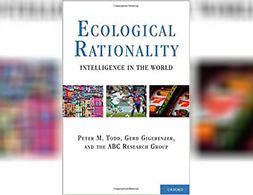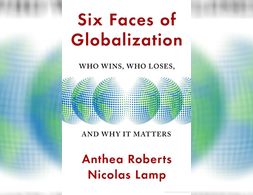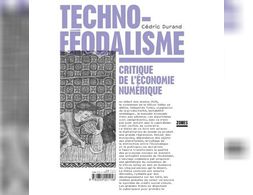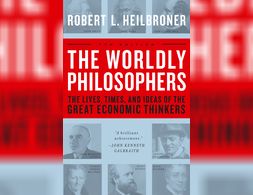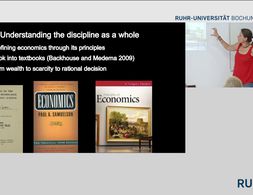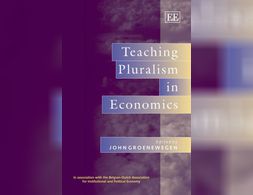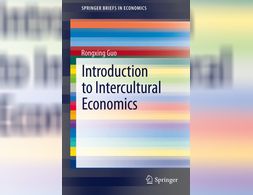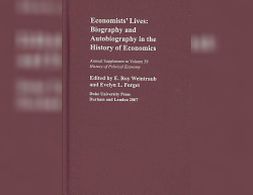513 results
The book explores the imperialist tendency inherent in global capitalism by using a rigorous political economy framework.
Within the heterodox field one of the most active topics is related to the theory of economic growth and distribution This is a textbook for advance undergraduate and graduate students Throughout its 18 chapters Classical Neoclassical and post Keynesian models are developed Each chapter contains study problems and suggested readings …
This book offers the first systematic analysis of economic thought concerning war.
More-is-better ideals such as these have long shaped our vision of rationality. Yet humans and other animals typically rely on simple heuristics to solve adaptive problems, focusing on one or a few important cues and ignoring the rest, and shortcutting computation rather than striving for as much as possible.
Introduces four of the most influential economists you'll never read in a modern economics class - Marx, Veblen, Keynes, and Galbraith.
An ideal type of a pluralistic book. Instead of arguing for one specific interpretation of a complex phenomenon, the authors present six different views on globalisation. Roberts and Lamp carefully balance the different perspectives, presenting the merits of each.
This report to the DEFRA summarizes the main approaches, opportunities and difficulties that come with individual carbon trading.
This course will focus on the emergence and evolution of industrial societies around the world We will begin by comparing the legacies of industry in ancient and early modern Europe and Asia and examining the agricultural and commercial advances that laid the groundwork for the Industrial Revolution of the 18th …
Human Rights Economics strives for an economic system that is just for people and respectful of the planet that promotes social and economic justice that integrates a plurality of views and traditions and that is human rights consistent in both its processes and outcomes It posits that economics is blind …
Why is it that some countries become rich while others remain poor? Do markets require regulation to function efficiently? If markets offer an efficient way of exchanging goods, why do individuals even create firms?
Au début des années 2020, le consensus de la Silicon Valley se délite. Inégalités folles, stagnation de la productivité, instabilité endémique... la nouvelle économie n’est pas advenue. Les algorithmes sont omniprésents, mais ce n’est pas pour autant que le capitalisme s’est civilisé. Au contraire. La thèse de ce livre est qu’avec la digitalisation du monde se produit une grande régression. Retour des monopoles, dépendance des sujets aux plateformes, brouillage de la distinction entre l’économique et le politique
In analyzing the global competition between Chinese and Indian tea, Andrew B. Liu challenges past economic histories premised on the technical “divergence” between the West and the Rest, arguing instead that seemingly traditional technologies and practices were central to modern capital accumulation across Asia.
Whiteness is a process of learning: one is not born white, but becomes one. In this rich and compelling volume, Sriprakash, Rudolph and Gerrard offer a meticulous (and eye-opening) reading of educational experiences and structures that endorse systemic racism.
From the mercantile monopolies of seventeenth-century empires to the modern-day authority of the WTO, IMF, and World Bank, the nations of the world have struggled to effectively harness globalization's promise. The economic narratives that underpinned these eras the gold standard, the Bretton Woods regime, the "Washington Consensus" brought great success and great failure.
This book is a collection of articles on topics and individuals within the history of heterodox economic thought, approached from a heterodox perspective. The principal topics are the nature and scope of economics as an intellectual venture.
This course offered by the International Monetary Fund (IMF) on edX provides an introduction in the major econometric tools used in standard Macroeconomics.
The 2022 FIFA World Cup (including the construction work required for it) provides a clear example of economic activity that has taken place despite the financial costs to the Qatari state being an order of magnitude larger than the financial benefits it will receive. Whilst this is a fairly extreme case in terms of how many different costs and benefits are involved and how unequally they have been spread, many economic decisions are more complicated than mere financial calculations and it is therefore vital for students to be able to think about multiple dimensions involved in economic decisions.
This course covers recent advances in behavioral economics by reviewing some of the assumptions made in mainstream economic models, and by discussing how human behavior systematically departs from these assumptions.
The course approaches migration as a constant phenomenon in human history and examines its main supporting theories It illustrates theories about people s individual decisions to migrate and also the factors of migration as a structural feature of our societies It explains the role social networks and institutions play in …
The bestselling classic that examines the history of economic thought from Adam Smith to Karl Marx—“all the economic lore most general readers conceivably could want to know, served up with a flourish” (The New York Times). The Worldly Philosophers not only enables us to see more deeply into our history but helps us better understand our own times. In this seventh edition, Robert L. Heilbroner provides a new theme that connects thinkers as diverse as Adam Smith and Karl Marx.
Dani Rodrik reflects in this book on important questions about how economics works and what might be wrong with it. He points out flaws and weakness of the discipline, but also argues that certain criticisms which have brought forward against are without merit. His central point is that there is not just one economic model, but a variety of them and it is important to apply judgment when selecting the most suitable one for a particular situation.
Identity politics is everywhere, polarising discourse from the campaign trail to the classroom and amplifying antagonisms in the media. But the compulsively referenced phrase bears little resemblance to the concept as first introduced by the radical Black feminist Combahee River Collective.
The goal of the class is to acquire familiarity with recently-published research in alternative macroeconomics with a focus on the distribution of income and wealth, cyclical growth models, and technical change.
In this lecture, Beatrice Cherrier explains why it is worth to research the history of JEL codes. The changing relationship between theory and application and the rise and death of new economic topics in the XXth century through the successive revisions of the classification system economists use to publish, recruit and navigate their discipline.
These notes aim to clarify some basic features and implications of gross capital flows In the context of the 2007 08 Global Financial Crisis and the 2010 12 Eurozone Crisis trade imbalances and capital flows received a lot of attention from academics policymakers and the media However there is still …
Exploring Economics, an open-source e-learning platform, giving you the opportunity to discover & study a variety of economic theories, topics, and methods.
Exploring Economics, an open-access e-learning platform, giving you the opportunity to discover & study a variety of economic theories, topics, and methods.
This volume is concerned with the different schools within the discipline of economics (theoretical pluralism) and the relationship of economics to other disciplines, such as sociology, political science and philosophy (interdisciplinarity).
This book presents a methodological framework for the analysis of intercultural issues frequently misinterpreted by existing theories. It uses a challenge-and-response theory of cultural development to examine the relationship between different natural disasters and threats and the developments of ancient civilizations.
To grasp sex in all its complexity, including its relationship to gender, class, race and power, Srinivasan argues that we need to move beyond the simplistic views of consent in the form of yes-no, to rather consider the more complex question of wanted-unwanted.
This lecture acts as an introduction to the Macroeconomics course (ECON 720) at John Jay College. Throughout the lecture, the classical and Keynesian conceptions of macroeconomic relationships are contrasted.
This collection of essays, a supplement to History of Political Economy, brings together prominent scholars from economics, sociology, literature, and history to examine the role of biography and autobiography in the history of economics. The first of its kind, this volume looks at the relevance of first-person accounts to narrative histories of economics.
Nous utilisons des cookies sur notre site Web. Cliquez sur Accepter pour nous aider à améliorer constamment Exploring Economics !




